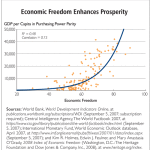One measure of a nation’s success is its economic health: how free are a nation’s citizens to pursue their own economic goals, and how wealthy on average are its citizens?
 Almost always the wealthy countries are those that enjoy a significant degree of the economic freedom. (See the chart in the image; click to enlarge.) The exceptions are those countries that are less free but happen to be sitting on huge supplies of an essential resource, e.g., oil.
Almost always the wealthy countries are those that enjoy a significant degree of the economic freedom. (See the chart in the image; click to enlarge.) The exceptions are those countries that are less free but happen to be sitting on huge supplies of an essential resource, e.g., oil.
Here is a list of the Top Ten for Economic Freedom:
1 Hong Kong
2 Singapore
3 Australia
4 New Zealand
5 Switzerland
6 Canada
7 Ireland
8 Denmark
9 United States
10 Bahrain
The list has significant geographical and cultural diversity — from Oceania to southeast Asia to the middle East to Europe to North America.
 Here’s a striking observation, though: 8 out of the 10 have strong British connections. Six are former British colonies: Hong Kong, Singapore, Australia, New Zealand, Canada, and the United States. Ireland has its own history of close relations with Britain. Bahrain’s connection is perhaps the weakest, but British India had strong cultural influence on Bahrain in the early part of the the twentieth century, and Great Britain itself had a strong presence in Bahrain until the Bahrainians declared formal independence from Britain in 1971.
Here’s a striking observation, though: 8 out of the 10 have strong British connections. Six are former British colonies: Hong Kong, Singapore, Australia, New Zealand, Canada, and the United States. Ireland has its own history of close relations with Britain. Bahrain’s connection is perhaps the weakest, but British India had strong cultural influence on Bahrain in the early part of the the twentieth century, and Great Britain itself had a strong presence in Bahrain until the Bahrainians declared formal independence from Britain in 1971.
So some questions: Is the British connection a coincidence? If not, why have former British colonies done so well economically? What special ideas, practices, and institutions did the British bring that gave countries that adopted them great economic advantages?
The two remaining nations on the list: Switzerland and Denmark. Both are in European, and in the western and northern parts of Europe. Has their path to economic freedom been significantly different?
Interesting observation, and it implies another question: Why England itself is not in this list of success?
Good question. The UK is currently 16th on the list. Full list here: http://tinyurl.com/4skmwwm
Also we can ask: Of the many other nations where the British Empire was a major presence, how have they fared?
not real sure but was told post ww2 pre ecc,denmark and britian were pretty close trading partners,fwiw
The answer to Dmitry’s question is, in part, shifts in ideas. Policy shifts can make a major difference to your rankings. (Australia, New Zealand and Ireland would not have rated high in 1960.) Liberal ideas were more alive in the Anglosphere (both broad and narrow) so more able to have revitalisations.
Which goes to Stephen’s question. It is more a matter of more possibilities and which possibilities are more “alive” in which institutional and social circumstances.
If you look at the number of Latin American countries which are First World ones and look at the state of affairs of the countries that colonise them, you’ll understand why. Even Argentina which once was richer than many now developed and successful European nations seems to be following into backward Venezuela’s footsteps. As the saying goes: “A fool and his money are soon parted.” It’s the mentality that matters. If the Vatican is infested by corruption, how can it surprising that Catholic Latin America to be any different.